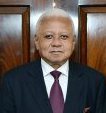This article may need to be rewritten to comply with Wikipedia's quality standards.(May 2025) |
The Hon. Chief Justice Mohamed Chande Othman | |
|---|---|
 | |
| Chief Justice of Tanzania | |
| In office 28 December 2010 –18 January 2017 | |
| Appointed by | Jakaya Kikwete |
| Preceded by | Augustino Ramadhani |
| Succeeded by | Ibrahim Hamis Juma |
| 2rd IJA Governing Council chairman | |
| President | Benjamin Mkapa |
| Preceded by | Ambassador Paul Rupia |
| Succeeded by | John Mrosso |
| Personal details | |
| Born | 1 January 1952 Tanganyika Territory |
| Alma mater | UDSM Webster University Geneva The Hague Academy of International Law |
| Profession | Judge prosecutor author |
Mohamed Chande Othman (born 1 January 1952) is a Tanzanian lawyer and a former Chief Justice of Tanzania.
Contents
- Education
- Biography
- United Nations High Level positions
- Tanzania Justice Department positions
- Other Legal and Professional experience
- Publications
- See also
- References
Internationally he is highly respected for his deep understanding of political,legal and other dimensions relating to International Humanitarian Law,Refugee Law,Criminal Law and Evidence,and Peacekeeping. He held various positions as expert advisor and UN prosecutor at criminal tribunals such as the UNDP Cambodia,the East Timor (UNTAET),the International Criminal Tribunal for Rwanda (ICTR),UN Human Rights Council for a) the Israel-Lebanon Armed Conflict and b) the Southern Sudan.
Currently he is head of the UN Independent Panel of Experts that examine new information on Dag Hammarskjölds death. [1]